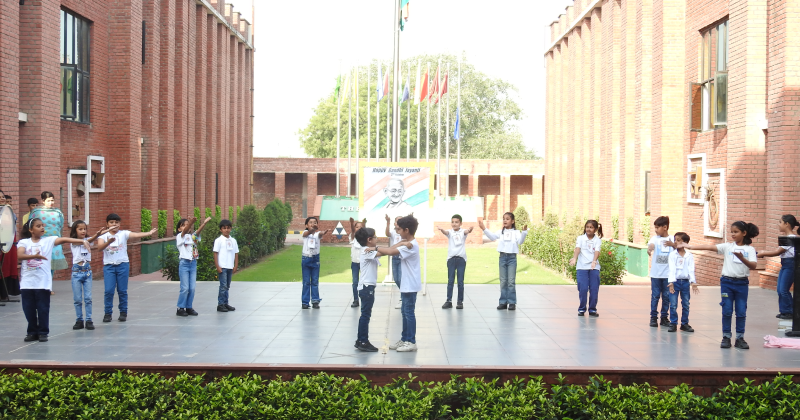
Education is a multifaceted endeavour that goes beyond imparting academic knowledge; it is a comprehensive process aimed at nurturing individuals who are not only intellectually capable but also emotionally intelligent. Emotional Intelligence plays a pivotal role in education, contributing significantly to the holistic development of students. In an era marked by rapid social and technological changes, educators and institutions must recognize the importance of fostering Social and Emotional Learning to equip students with the necessary skills to thrive in the 21st century. The Modern School Faridabad fosters an environment that sustains all measures that accommodate fruitful tools of social and emotional development.
Emotional Intelligence refers to the ability to recognize, understand, manage, and effectively utilize one's emotions and the emotions of others. It encompasses self-awareness, self-regulation, empathy, and interpersonal skills. In an educational context, EI goes beyond academic achievement; it involves cultivating the emotional well-being and interpersonal abilities of students.
Emotional Intelligence positively correlates with academic success. Students with a high level of EI tend to be more motivated, focused, and resilient. They can manage stress effectively, which enhances their learning abilities. Furthermore, they exhibit better self-regulation, which is essential for time management and goal setting.


Schools are not just about textbooks and exams; they are a microcosm of society where students learn to interact with diverse peers and educators. Developing strong interpersonal skills through EI is crucial for fostering positive relationships, collaboration, and effective communication. These skills are vital not only during school but throughout life. Emotional intelligence nurtures mental and emotional well-being. It helps students understand their emotions and address them in a healthy manner, reducing anxiety, depression, and other emotional issues. This self-awareness aids students in managing stress and developing resilience, which are essential life skills. Students with high EI are better equipped to handle conflicts and solve problems. They can empathise with others, which is a key component of conflict resolution. By understanding their own emotions, they can also approach challenges with a clear, rational mindset. The 21st-century workforce demands leaders with strong emotional intelligence. Leaders must inspire, motivate, and connect with their team members, and these qualities are deeply rooted in EI. Schools must nurture these qualities in students to prepare them for leadership roles in the future.
To realise the importance of EI in education, schools must actively implement SEL programs. These programs are designed to promote the development of emotional intelligence and interpersonal skills in students. The Modern School Faridabad considers the various strategies for incorporating SEL into its curriculum.
Incorporating SEL into the curriculum ensures that it is treated with the same importance as academic subjects. Students are given lessons that teach emotional awareness, empathy, conflict resolution, and stress management. For example, including activities that promote peer discussions, group projects, and mindfulness exercises can foster emotional growth. Teachers play a pivotal role in modelling and imparting emotional intelligence. The educators are well-versed in understanding and teaching emotions, as well as creating a supportive classroom environment. The school environment is conducive to emotional growth. It is ensured that students feel safe expressing their emotions without fear of ridicule or judgement. Bullying prevention programs and anti-discrimination initiatives can be part of this effort. Parents are essential partners in fostering SEL. The school organises workshops and sessions to educate parents about the importance of emotional intelligence and provide them with tools to support their children's emotional development at home.
SEL fosters a more positive classroom atmosphere, promoting respect, cooperation, and active engagement in the learning process. This, in turn, makes teaching and learning more enjoyable and effective. As students develop emotional intelligence and resilience, they are better equipped to deal with the stresses of academic life. This can reduce the prevalence of mental health issues among students. SEL programs create a heightened awareness of the consequences of bullying and conflicts. By teaching empathy and conflict resolution, schools can significantly reduce such incidents. Students who develop strong emotional intelligence are better prepared for the challenges of life beyond the classroom. They are equipped with essential life skills that promote success and well-being. The positive impact of SEL extends well beyond school years. Students who have honed their emotional intelligence are more likely to become emotionally mature, empathetic, and successful adults.
In today's rapidly changing world, the importance of Emotional Intelligence in education cannot be overstated. The Modern School Faridabad, like all educational institutions, should recognize the significance of fostering Social and Emotional Learning (SEL) to prepare students for the 21st century. By implementing SEL programs, integrating emotional intelligence into the curriculum, and creating a supportive environment, schools can empower students to excel academically, build strong interpersonal relationships, and navigate the challenges of life with confidence and resilience. In doing so, they not only enhance the educational experience but also contribute to the holistic development of individuals who are emotionally intelligent, socially responsible, and ready to make a positive impact on the world.